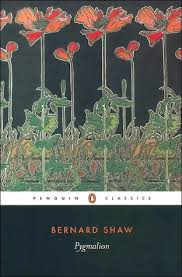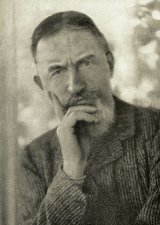Pygmalion Page #25
Pygmalion is a play by George Bernard Shaw, named after a Greek mythological figure. It was first presented on stage to the public in 1913. In ancient Greek mythology, Pygmalion fell in love with one of his sculptures, which then came to life.
And that is just what Eliza did. Complications ensued; but they were economic, not romantic. Freddy had no money and no occupation. His mother's jointure, a last relic of the opulence of Largelady Park, had enabled her to struggle along in Earlscourt with an air of gentility, but not to procure any serious secondary education for her children, much less give the boy a profession. A clerkship at thirty shillings a week was beneath Freddy's dignity, and extremely distasteful to him besides. His prospects consisted of a hope that if he kept up appearances somebody would do something for him. The something appeared vaguely to his imagination as a private secretaryship or a sinecure of some sort. To his mother it perhaps appeared as a marriage to some lady of means who could not resist her boy's niceness. Fancy her feelings when he married a flower girl who had become declassee under extraordinary circumstances which were now notorious! It is true that Eliza's situation did not seem wholly ineligible. Her father, though formerly a dustman, and now fantastically disclassed, had become extremely popular in the smartest society by a social talent which triumphed over every prejudice and every disadvantage. Rejected by the middle class, which he loathed, he had shot up at once into the highest circles by his wit, his dustmanship (which he carried like a banner), and his Nietzschean transcendence of good and evil. At intimate ducal dinners he sat on the right hand of the Duchess; and in country houses he smoked in the pantry and was made much of by the butler when he was not feeding in the dining-room and being consulted by cabinet ministers. But he found it almost as hard to do all this on four thousand a year as Mrs. Eynsford Hill to live in Earlscourt on an income so pitiably smaller that I have not the heart to disclose its exact figure. He absolutely refused to add the last straw to his burden by contributing to Eliza's support. Thus Freddy and Eliza, now Mr. and Mrs. Eynsford Hill, would have spent a penniless honeymoon but for a wedding present of 500 pounds from the Colonel to Eliza. It lasted a long time because Freddy did not know how to spend money, never having had any to spend, and Eliza, socially trained by a pair of old bachelors, wore her clothes as long as they held together and looked pretty, without the least regard to their being many months out of fashion. Still, 500 pounds will not last two young people for ever; and they both knew, and Eliza felt as well, that they must shift for themselves in the end. She could quarter herself on Wimpole Street because it had come to be her home; but she was quite aware that she ought not to quarter Freddy there, and that it would not be good for his character if she did. Not that the Wimpole Street bachelors objected. When she consulted them, Higgins declined to be bothered about her housing problem when that solution was so simple. Eliza's desire to have Freddy in the house with her seemed of no more importance than if she had wanted an extra piece of bedroom furniture. Pleas as to Freddy's character, and the moral obligation on him to earn his own living, were lost on Higgins. He denied that Freddy had any character, and declared that if he tried to do any useful work some competent person would have the trouble of undoing it: a procedure involving a net loss to the community, and great unhappiness to Freddy himself, who was obviously intended by Nature for such light work as amusing Eliza, which, Higgins declared, was a much more useful and honorable occupation than working in the city. When Eliza referred again to her project of teaching phonetics, Higgins abated not a jot of his violent opposition to it. He said she was not within ten years of being qualified to meddle with his pet subject; and as it was evident that the Colonel agreed with him, she felt she could not go against them in this grave matter, and that she had no right, without Higgins's consent, to exploit the knowledge he had given her; for his knowledge seemed to her as much his private property as his watch: Eliza was no communist. Besides, she was superstitiously devoted to them both, more entirely and frankly after her marriage than before it. It was the Colonel who finally solved the problem, which had cost him much perplexed cogitation. He one day asked Eliza, rather shyly, whether she had quite given up her notion of keeping a flower shop. She replied that she had thought of it, but had put it out of her head, because the Colonel had said, that day at Mrs. Higgins's, that it would never do. The Colonel confessed that when he said that, he had not quite recovered from the dazzling impression of the day before. They broke the matter to Higgins that evening. The sole comment vouchsafed by him very nearly led to a serious quarrel with Eliza. It was to the effect that she would have in Freddy an ideal errand boy. Freddy himself was next sounded on the subject. He said he had been thinking of a shop himself; though it had presented itself to his pennilessness as a small place in which Eliza should sell tobacco at one counter whilst he sold newspapers at the opposite one. But he agreed that it would be extraordinarily jolly to go early every morning with Eliza to Covent Garden and buy flowers on the scene of their first meeting: a sentiment which earned him many kisses from his wife. He added that he had always been afraid to propose anything of the sort, because Clara would make an awful row about a step that must damage her matrimonial chances, and his mother could not be expected to like it after clinging for so many years to that step of the social ladder on which retail trade is impossible. This difficulty was removed by an event highly unexpected by Freddy's mother. Clara, in the course of her incursions into those artistic circles which were the highest within her reach, discovered that her conversational qualifications were expected to include a grounding in the novels of Mr. H.G. Wells. She borrowed them in various directions so energetically that she swallowed them all within two months. The result was a conversion of a kind quite common today. A modern Acts of the Apostles would fill fifty whole Bibles if anyone were capable of writing it. Poor Clara, who appeared to Higgins and his mother as a disagreeable and ridiculous person, and to her own mother as in some inexplicable way a social failure, had never seen herself in either light; for, though to some extent ridiculed and mimicked in West Kensington like everybody else there, she was accepted as a rational and normal--or shall we say inevitable?--sort of human being. At worst they called her The Pusher; but to them no more than to herself had it ever occurred that she was pushing the air, and pushing it in a wrong direction. Still, she was not happy. She was growing desperate. Her one asset, the fact that her mother was what the Epsom greengrocer called a carriage lady had no exchange value, apparently. It had prevented her from getting educated, because the only education she could have afforded was education with the Earlscourt green grocer's daughter. It had led her to seek the society of her mother's class; and that class simply would not have her, because she was much poorer than the greengrocer, and, far from being able to afford a maid, could not afford even a housemaid, and had to scrape along at home with an illiberally treated general servant. Under such circumstances nothing could give her an air of being a genuine product of Largelady Park. And yet its tradition made her regard a marriage with anyone within her reach as an unbearable humiliation. Commercial people and professional people in a small way were odious to her. She ran after painters and novelists; but she did not charm them; and her bold attempts to pick up and practise artistic and literary talk irritated them. She was, in short, an utter failure, an ignorant, incompetent, pretentious, unwelcome, penniless, useless little snob; and though she did not admit these disqualifications (for nobody ever faces unpleasant truths of this kind until the possibility of a way out dawns on them) she felt their effects too keenly to be satisfied with her position.
Translation
Translate and read this book in other languages:
Select another language:
- - Select -
- 简体中文 (Chinese - Simplified)
- 繁體中文 (Chinese - Traditional)
- Español (Spanish)
- Esperanto (Esperanto)
- 日本語 (Japanese)
- Português (Portuguese)
- Deutsch (German)
- العربية (Arabic)
- Français (French)
- Русский (Russian)
- ಕನ್ನಡ (Kannada)
- 한국어 (Korean)
- עברית (Hebrew)
- Gaeilge (Irish)
- Українська (Ukrainian)
- اردو (Urdu)
- Magyar (Hungarian)
- मानक हिन्दी (Hindi)
- Indonesia (Indonesian)
- Italiano (Italian)
- தமிழ் (Tamil)
- Türkçe (Turkish)
- తెలుగు (Telugu)
- ภาษาไทย (Thai)
- Tiếng Việt (Vietnamese)
- Čeština (Czech)
- Polski (Polish)
- Bahasa Indonesia (Indonesian)
- Românește (Romanian)
- Nederlands (Dutch)
- Ελληνικά (Greek)
- Latinum (Latin)
- Svenska (Swedish)
- Dansk (Danish)
- Suomi (Finnish)
- فارسی (Persian)
- ייִדיש (Yiddish)
- հայերեն (Armenian)
- Norsk (Norwegian)
- English (English)
Citation
Use the citation below to add this book to your bibliography:
Style:MLAChicagoAPA
"Pygmalion Books." Literature.com. STANDS4 LLC, 2025. Web. 12 Jan. 2025. <https://www.literature.com/book/pygmalion_78>.




Discuss this Pygmalion book with the community:
Report Comment
We're doing our best to make sure our content is useful, accurate and safe.
If by any chance you spot an inappropriate comment while navigating through our website please use this form to let us know, and we'll take care of it shortly.
Attachment
You need to be logged in to favorite.
Log In